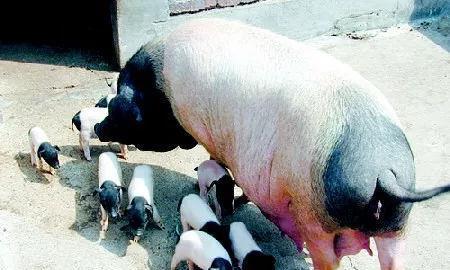After the Opium War of 1840, China entered the years of backwardness and beating in modern times. Against the backdrop of the signing of a series of unequal treaties, the economy of the late Qing Dynasty was severely constrained by the hands of foreign powers. The development of traditional handicrafts, small-scale peasant economic industries and national industry and commerce is struggling. But in this special era, an inconspicuous industry went up against the wind, not only spread throughout the country, but also gradually monopolized the entire international market, becoming a Chinese industry that even European and American industrial powers could not avoid.

Pig bristles, that is, bristles on the back of the pig's spine, were also called "bristles" in ancient China. Because of its special material, it was used by many families to make bristles before the late Qing Dynasty, but most of them were used for their own use and were not taken away. However, with the advent of the industrial revolution, bristles have become bristle materials for many daily necessities because of their good toughness and strong adsorption, and their value has increased suddenly.
After the outbreak of World War II, the U.S. government placed bristles as important A-class strategic materials as munitions in 1940 and handed them over to the elite aviation force Flying Tigers for a long time. The Flying Tigers took off from southwest China to transport the bristles to India and then to the U.S. mainland. The route, which passes through the Himalayas at an altitude of more than 8,000 meters, is known as a death route due to its high wreck rate.
The reason why pig bristles are so popular with the US military is that brushes made of bristles can not only be used to paint and maintain the appearance of weapons, but also play a vital role in the maintenance of the barrel and the inner wall of the barrel. After firing ammunition, many guns and artillery in World War II will have a part of the residue after the gunpowder is burned and attached to the inner wall of the barrel and barrel, which will shorten the life of the cannon and even affect the shooting accuracy if it is not cleaned up in time. This requires a special brush to clean, the bristles must be able to withstand high temperatures, moisture, meet a certain strength, not easy to break, not knotted. To meet so many conditions, bristles are the best choice.
To this day, scientists have not been able to find an artificial material to replace the bristles, which shows how unique it is. It is precisely because of the strategic significance of the bristle industry that although the political arena changed frequently during the Republic of China, successive governments have always paid great attention to bristles. In Sichuan and other major pig-raising provinces, the government has successively issued a series of tax reductions and other incentive measures, and even set up trade houses to protect small and medium-sized pig owners. By 1933, China had a complete bristle inspection and purchase and sales system, and successfully achieved standardized production. In 1937, the export income of the bristle industry brought 27.92 million yuan of foreign exchange inflows to China, which was of great significance to China, which was poor and weak at that time.
During World War II, China formed anti-fascist alliances with the United States, Britain, and other countries, signed a series of loan agreements, obtained loans worth up to $1.1 billion, and adopted the method of "bartering" to export urgently needed support materials to allies. These urgently needed materials such as tung oil, rare earths, rubber, etc., but the most important is the bristles. The seemingly small bristles have become an incomparably important industrial pillar in the era of China's War of Resistance Against Japanese Aggression, helping the Chinese military and civilians survive the most difficult times and win the final victory.
After the victory of the War of Resistance Against Japanese Aggression, China became one of the five major powers of the United Nations and won its undisputed status as a world power. This stems from the perseverance of all Chinese soldiers and civilians in that era, not only the soldiers who fought in blood on the front line, but also the people from all walks of life who persevered to the end. Those people who silently feed, shave and process the front-line operation of the bristle industry are also heroes who won the war for China.